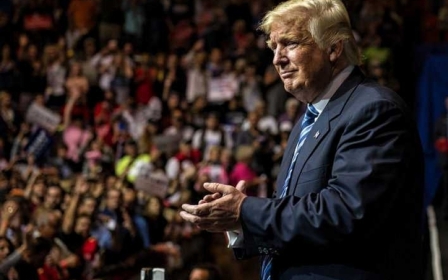Number of Middle Eastern student applications drops in US: Survey

A nationwide survey released on Tuesday showed that the number of university applicants hailing from Middle Eastern nations substantially dwindled this fall from previous years. The survey found that the total number of international students in the 260 surveyed US undergraduate programmes dropped 20 percent, compared to the same period last year.
More than 40 percent of surveyed educational institutions reported a drop in undergrad applications, the majority of them from Muslim-majority countries.
The American Association of Collegiate Registrars and Admissions Officers (AACRAO), a non-profit that encourages best practices in international admissions for higher education in the US, carried out the study.
Though the paper doesn't go into detail regarding which particular institutions in the United States participated, hundreds of universities and colleges nationwide volunteered to take the survey.
“We have to understand that this is a snapshot, it's not an in-depth research”, said Sharon Witherell, director of public affairs at Institute of International Education (IIE), which partners with AACRAO. “This information has to be taken with a grain of salt, as an indicator rather than a trend, at least for now, because it's only analyzing a trimester,” Witherell said.
That's something officials at the University of California, one of the most highly regarded education networks worldwide, caution as well - especially because recently released data doesn't paint a positive picture for their international applications either, with a decline in their numbers for the first time in 12 years.
We have to understand that this is a snapshot, it's not an in-depth research
- Sharon Witherell, Director of Public Affairs at Institute of International Education
Collectively, international undergrad students from Muslim-majority countries sent in 10 percent fewer applications to UC than in the previous 12 years, while Mexican students sent 30 percent fewer.
“Obviously, international students look at the news in the US and may feel intimidated because of the political climate,” Ricardo Vazquez, from the University of California network, told MEE on the phone. “But, to say this is only due to Trump's policies, it's too soon to know the exact reasons, these numbers fluctuate from year to year.”
According to Vazquez, the numbers are so small that we can't really talk about a plunge, but rather a small “dip”, at least concerning UC data.
“Let's take a look at Saudi Arabia, they had 182 applications last year, and this fall 167 students reached out to us; those numbers are not really significant,” Vazquez said. Other countries, like Turkey, who last year sent in 300 applications, reduced their applications to 265, while the United Arab Emirates only saw a slight fall with a tiny drop of seven applications compared to last year.
Numbers don't lie
“We are aware that there has been a drop, however small, and we are looking into the possible reasons,” Vazquez said, “but we have to take other things into account, like the rising cost of tuition in the past years.”
More than a million foreign students choose the US to pursue their undergraduate or graduate studies, with a plurality (about 150,000) favouring California's colleges, according to IIE. Last year, UC increased tuition for non-Californian students by 8 percent, bringing the total annual cost to almost $42,000.
Malak El-Quessny, a UC Berkeley grad student from Egypt, thinks that could be one of the determining factors for the drop in applications.
“We also have to take a look at the GDP of each country that sent fewer applications, maybe their GDP went down too,” El-Quessny said. “Maybe Trump and his Muslim ban had much to do with it, on a local and national level, but I think it's too soon to tell. It was impossible to foresee that in November, when he won, because the application deadline was November 30.”
The national report, however, did reveal that a vast majority of Middle Eastern prospective applicants (54 percent) were anxious regarding their immigration status if they were to enroll in a US college. Their Latin American counterparts expressed similar concerns, with 56 percent of respondents doubting their prospective migratory security.
Maybe Trump and his Muslim ban had much to do with it, on a local and national level, but I think it's too soon to tell
- Malak El-Quessny, UC Berkeley grad student
Also, 28 percent of Middle Eastern respondents expressed “feeling unwelcome” amid Trump's rhetoric and his immigration policies.
“There are a few national and local initiatives by educational institutions to show foreign students they are welcome, but for now, I don't think educational institutions are very worried about this small decline,” Witherell said. “I think everyone is going to wait and see if this is just a hiccup or a real trend.”
The survey concludes that for now, the administration is not involved in any effort to reverse this possible trend, and it acknowledges that the political climate most likely played some part in the plunging numbers. It also acknowledges that regardless of the political situation, US educational institutions still believe in the power of international education.
“International education is at the heart of US higher education. The positions of the current administration will not change the dispositions of individual institutions. International students will continue to be welcome,” the report said.
New MEE newsletter: Jerusalem Dispatch
Sign up to get the latest insights and analysis on Israel-Palestine, alongside Turkey Unpacked and other MEE newsletters
Middle East Eye delivers independent and unrivalled coverage and analysis of the Middle East, North Africa and beyond. To learn more about republishing this content and the associated fees, please fill out this form. More about MEE can be found here.




